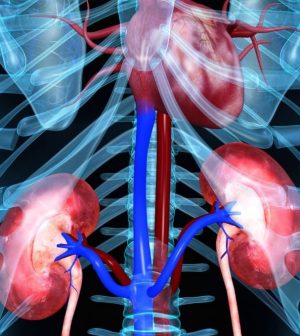- Could Your Grocery Store Meat Be Causing Recurring UTIs?
- Are You Making This Expensive Thermostat Error This Winter?
- Recognizing the Signs of Hypothyroidism
- 10 Strategies to Overcome Insomnia
- Could Artificial Sweeteners Be Aging the Brain Faster?
- Techniques for Soothing Your Nervous System
- Does the Water in Your House Smell Funny? Here’s Why
- Can a Daily Dose of Apple Cider Vinegar Actually Aid Weight Loss?
- 6 Health Beverages That Can Actually Spike Your Blood Sugar
- Treatment Options for Social Anxiety Disorder
Combo Treatment Doubles Survival for Patients With Advanced Kidney Cancer

A small clinical trial suggests that a duo of drugs can extend survival for people battling advanced kidney cancer.
Researchers at Roswell Park Comprehensive Cancer Center in Buffalo, N.Y., developed the new regimen, a combination of pazopanib (Votrient) and bevacizumab (Avastin).
Pazopanib is from a class of cancer drugs know as tyrosine kinase inhibitors (TKIs). These drugs work by blocking vascular endothelial growth factor (VEGF) signaling — a key mechanism that cancer cells need to grow.
In prior trials that led to pazopanib’s approval by the U.S. Food and Drug Administration, the drug led to an average survival (without cancer progression) of just over 11 months among people diagnosed with kidney tumors.
The new trial, which involved 51 patients, found that combining pazopanib treatment with bevacizumab doubled that progression-free survival, to more than 23 months, on average.
Patients received pazopanib and bevacizumab in 10-week treatment cycles.
They first underwent treatment with pazopanib during days 1 to 28.
As a team led by by Dr. Saby George explained, pazopanib works by shutting down VEGF, but any increase in VEGF can lead to cancer cell resistance against the drug.
So, patients got bevacizumab midway through the 10-week cycle (days 36 to 50), since that drug “neutralizes” VEGF — potentially extending pazopanib’s cancer-fighting power.
The strategy appears to have worked, greatly boosting survival among those patients who received it.
Some patients with advanced kidney cancers were good candidates for powerful immunotherapy cancer medicines, but George’s team noted that pazopanib/bevacizumab might be a safer option for some.
The combo drug therapy had “superior safety compared with immunotherapy combinations,” the researchers noted in a Roswell news release.
“Because immunotherapy options were available to patients in other risk groups, the phase 2 group included more patients in the Favorable Risk category,” said George, a professor of oncology and medicine at Roswell. “The encouraging results suggest that alternating pazopanib with bevacizumab is a promising treatment regimen for renal cell [kidney] carcinoma patients in the Favorable Risk group.”
The findings were presented Sunday at the European Society for Medical Oncology (ESMO) Congress in Barcelona, Spain. Because the study was presented at a medical meeting, its findings should be considered preliminary until published in a peer-reviewed journal.
More information
Find out more about kidney cancer at the American Cancer Society.
SOURCE: Roswell Park Comprehensive Cancer Center, news release, Sept. 15, 2024
Source: HealthDay
Copyright © 2026 HealthDay. All rights reserved.










